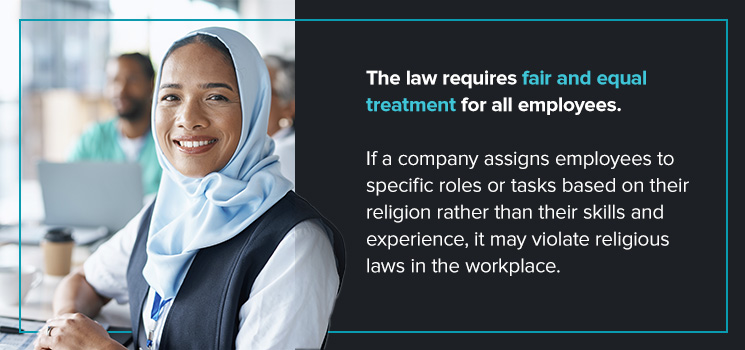By Weisberg Cummings, P.C. on January 9th, 2024
Everyone deserves the freedom to practice their religion and receive fair treatment in the workplace. Still, many employees and job candidates face religious discrimination from employers, customers or colleagues.
Many legal bodies prohibit such behavior, so you must know your rights. Here, we’ll explore the various legal options and what you legally need to prove the violation of religious law in the workplace.
Defining Religious Discrimination
Religious discrimination is treating an employee or applicant differently from other people due to their religious beliefs, request for accommodation or spiritual practices and beliefs. This discrimination can also occur when someone treats an employee unfairly due to their practices or relationship with someone who follows a specific faith.
Legal bodies passed laws such as Title VII of the Civil Rights Act of 1964 and the Pennsylvania Human Relations Act to protect employees and job candidates from discrimination and religious harassment in the workplace. According to the Equal Employment Opportunity Commission, religious discrimination can appear in employment in four ways.
1. Religious Accommodation
The law demands that employers reasonably accommodate a worker’s religious practices and beliefs, including maintaining their faith-based grooming and dress practices and making schedule changes to accommodate religious observances, unless these will significantly adversely affect the employer’s business.
2. Harassment
If an employee experiences frequent offensive remarks such as offhand comments, derogatory slurs and teasing about their religious beliefs that create a hostile environment, it counts as religious harassment. Whether the behavior comes from a supervisor, colleague or client, the employer may be liable for religious discrimination violations if they avoid addressing the issue.
3. Adverse Employment Decisions
Employers and other people with authority in the workplace must make fair and reasonable decisions. Choosing to demote, fire, reduce pay and hours, avoid hiring or reduce job assignments, benefits and training for someone based on their religion may be grounds for a religious discrimination claim.
4. Segregation
The law requires fair and equal treatment for all employees. If a company assigns employees to specific roles or tasks based on their religion rather than their skills and experience, it may violate religious laws in the workplace. For example, an employer might reassign an employee to a non-customer-facing role.
Legal Requirements for Proving Religious Discrimination
The four types of religious discrimination mentioned above fall into two primary categories.
- Disparate treatment: The unfair treatment of employees due to their religion
- Reasonable accommodation: Requires employers to reasonably accommodate an employee’s religious beliefs and practices
You can follow several steps to prove the type of religious discrimination you experience.
Steps to Prove Disparate Treatment
Adverse employment actions, harassment and segregation based on religious beliefs and practices typically fall into this category. Here are some steps you may take to establish a case if you believe you are experiencing unfavorable treatment from a colleague or supervisor.
- Establish that you are an active member of a recognized religion or protected class, such as atheists and agnostics.
- Determine whether workers within your company with similar roles yet different religious beliefs have received more favorable treatment in the workplace than you have.
- Gather evidence to prove you experienced an adverse action. Direct evidence can include emails, recordings, text messages or letters, while indirect evidence may include proven facts and situations that establish someone’s liability for discriminatory behavior.
- Connect the dots and show how the evidence relates to a particular religious law. You may benefit from working with an experienced employment law attorney to help you prove disparate treatment.
Steps to Prove Unfair Denial of Reasonable Accommodation
When asking your employer for reasonable religious accommodation, remember that your request must come from a sincere religious conviction associated with an organized group rather than a personal preference.
Additionally, your employer may refuse to adapt to your needs if they can prove it would bring harm or undue adversity to the company regarding lost efficiency, costliness and workplace safety. Still, you can take steps to establish an unfair denial of reasonable accommodation if you believe your request may not trigger a hardship for the business:
- Establish you have a legitimate religious belief that clashes with a company policy.
- Gather evidence that you informed your employer about your faith and its conflict with the company policy.
- Establish that your employer could have made accommodations without it leading to undue hardship.
- Speak with a religious discrimination lawyer about your situation to verify whether you may have a case.
Can You Sue Your Employer for Religious Discrimination?
If your employer has behaved unfairly toward you based on your religion or refused to assist you in reducing religious discrimination from co-workers, you may be able to sue your employer for religious discrimination. You may win your case with a knowledgeable attorney’s help if there were any witnesses, such as clients, managers or other employees, and you have substantial evidence to show you faced different treatment due to your religion.
Pennsylvania residents may first want to file a complaint with the state’s human relations commission. After reviewing your case, they will investigate the matter with your employer and attempt to negotiate a solution. If you have issues resolving the problem, you may gain the right to sue your employer and pursue a case against them.
How Weisberg Cummings Can Help
Have you encountered religious discrimination violations in the workplace? The EEOC and PHRC prohibit this type of unfair treatment in the workplace under any unreasonable terms. Weisberg Cummings offers assistance through our employment law services.
We are a Pennsylvania law firm with skilled employment law attorneys with years of experience helping clients bring discrimination cases. For personalized assistance, we welcome you to call us at 855-716-2367 or contact us for a free consultation today so we can understand your unique situation and inform you of your legal options.



